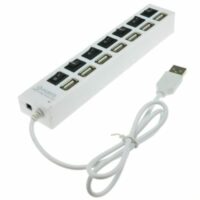A USB hub expands a single port into several so that you can connect more devices to a computer. There are three common types of USB hubs – USB 3.0, 2.0, and 1.1.
If your Generic USB Hub is not working properly, it could be because of a driver issue. Try updating the driver, or changing power management settings to see if that helps.
How to Update the Generic USB Hub Driver Windows 11:
If you are using Generic USB Hub Driver Windows 11, you need to make sure that the driver is updated. You can do this through Device Manager or the Automatic Driver Update Tool.
To update the driver, open the device manager and expand the Universal Serial Bus controllers section. Right-click on the Generic USB Hub option and select Update Driver.
This will search the Internet for compatible drivers and install them automatically. Once the process is complete, your device should be recognized again.
Another way to update the driver is by downloading the latest version of the driver from the manufacturer’s website. This method is usually the best solution because it is digitally signed and will work on Windows.
If you aren’t able to find the latest driver on the manufacturer’s website, try checking with a system information tool.
These tools will give you all the information about your motherboard, including USB drivers. They also allow you to download drivers directly from the manufacturer’s support site, if available.
Troubleshooting process:
USB Hubs are devices that expand a single USB port into several, giving you the freedom to connect more peripherals. There are three types of hubs – USB 3.0, USB 1.1, and FireWire.
If you have trouble connecting devices to your computer, the problem might be caused by a USB driver that is outdated or missing. To fix this, you should manually update the driver or try reinstalling it.
To do this, you should open Device Manager in Windows. Double-click Universal Serial Bus controllers to expand the list.
Repeat this process for each USB Root Hub in the list to uninstall the driver. Then, restart your computer.
Another possible reason for the issue could be a power supply that does not provide enough power to your USB ports. This can cause USB ports to stop working.
Repairing the Driver:
If you have a USB device that does not show up when you plug it into your computer, it may be because of an outdated or missing driver. This is why it’s important to update your USB drivers regularly.
If this doesn’t help, you may need to repair the driver. You can do this manually or automatically using the Windows system repair tool.
One of the first things you should try is resetting the USB port settings. You can do this by opening the Device Manager, and then double-clicking on Universal Serial Bus controllers.
Once you’ve done that, you should see the Generic USB Hub listed.
You’ll also be able to see the number of devices connected to it, resource memory settings, IRQ, and conflicting devices.
You can also try to roll back the driver to an earlier version to see if this solves the issue. However, keep in mind that this is a time-consuming process and could result in losing data.
Reinstalling the Generic USB Hub Driver Windows 11:
If you have trouble with USB ports on your PC, there are several solutions to get them working again. One of them is to reinstall the driver.
The most popular way to reinstall the driver is by using Device Manager. The problem with this method is that it can sometimes remove USB drivers that are unstable or damaged.
However, if it does not solve the problem, try other methods.
First, check if your devices work on other ports. If they do, there may be a hardware issue with the port that’s causing the problem.
Next, restart your computer and see if that helps. If it doesn’t, then the USB device is probably damaged.
Another solution is to reinstall the Generic USB Hub Driver Windows 11. It’s possible that your USB device’s driver has become corrupt or outdated, and updating it could fix the issue.

